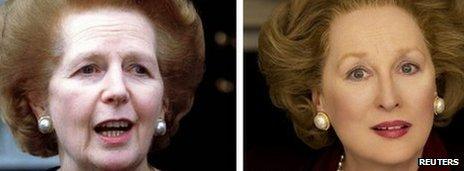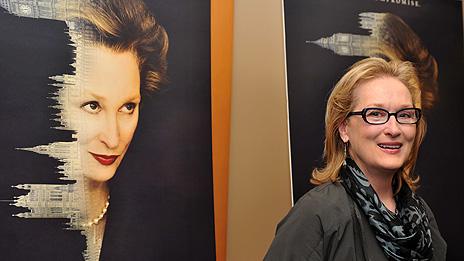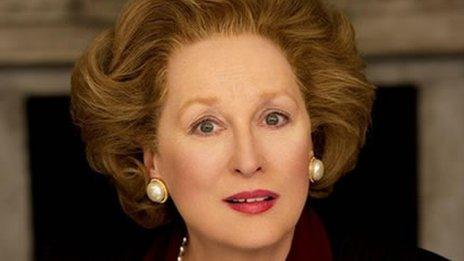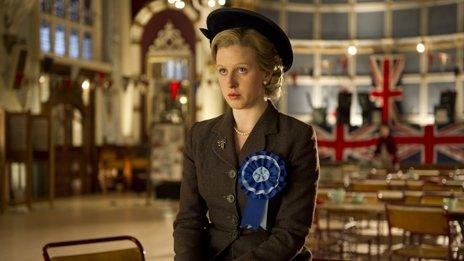The Iron Lady
- Published
- comments

I will never forget the first time I visited 10 Downing Street. Margaret Thatcher was Prime Minister and I was determined to use a meeting with her to discuss a report on the growing problem of homelessness amongst the young.
No-one, of course, out-determined Mrs Thatcher, who had seen off many much more powerful men than me. I was greeted with an unsettling mixture of one-part feminine charm and another part steely resolve - in this case to talk about pretty much anything else other than homelessness.
Meryl Streep's remarkable portrayal of "The Iron Lady" brilliantly captures the politician I remember and charts the immensity of her achievement in becoming Britain's first and, more than three decades later, only woman Prime Minister.
The Thatcher premiership was already unravelling by the time I became a political journalist. My first big story was the forced ejection from office by her own party of a serving, three-time election winner. This film shows why so many came to feel like the Tory MP who, on a report I produced, called on her "to hang up her boots" and retire gracefully in 1990. She didn't, of course, and we see the devastating impact it had on a woman who had had to fight against all the odds to make it to Number 10 in the first place.
The last time I spent any time discussing politics with Lady Thatcher was some years ago. Even then moments of great lucidity - usually about the past - were followed by moments when it was all too evident that the Iron Lady's once steely mind was, sadly, beginning to rust. This film controversially and sometimes painfully puts that on show too.
The Iron Lady works as a compelling three dimensional personal drama. As political documentary it is two dimensional. This is not an assessment of the Thatcher Years. It is a vivid and, at times, moving story of one woman's lonely and dogged fight against the painfully limited expectations of her own gender embodied by her own mother, the unquestioning prejudice of most men of her age and the suffocating instinct to patronise of those who have inherited their positions rather than earned them.
It charts Margaret Thatcher's permanent struggle in 11 long years in office against the doubters in her own party, those she regarded as "the enemy within" - whether in the trade unions or the IRA - and "the enemy without" - Soviet Communists and the Argentine junta who ordered the invasion of the Falklands.
The film does not so much fail as fail to try to chart the social impact of her policies, the political choices flunked as well those stuck to resolutely or questions about whether she or her critics - whether in the Labour Party or the Tory "wets" who warned of the consequences of her economic policies or the Cabinet who ultimately forced her from office - were right or wrong.
The Iron Lady is a string of episodes demonstrating Margaret Thatcher's remarkable strength, stubbornness and resolve combined with flashes of feminine charm. So, one moment she is seen delivering an excoriating lecture to the US Secretary of State about the need for America to stand by her friends during the Falklands War. The next, as Al Haig is still reeling, she asks in sweet motherly tones whether he'd like her to pour the tea.
It is memorable, it is funny but it comes as no surprise. What does is the loneliness of a woman whose mother does not understand her, whose daughter disappoints her, whose spoilt son neglects her and whose political coach and confidante, Airey Neave, is blown up by an IRA bomb before she has made it to Downing Street. She has only Denis, the husband who is both her cheerleader and her connection to some part of real world. But now Denis too is gone.
It is the film's portrayal of the widowed Iron Lady today talking to Denis as if he is still at her side that has offended some of those closest to her. The scene in which her daughter Carol sits on the side of her mother's bed and tells her Daddy is dead, Mark is in South Africa and that she is not Prime Minister must be particularly painful. It is, though, also particularly poignant. When I watched I detected not cruelty from the writer or director or cast but an observation of the price of power - Thatcher is far from the first former leader to decline rapidly once out of office - and a means of providing the film with its narrative thread.
The Iron Lady begins with a bewildered old woman wandering unrecognised into a corner shop to buy some milk. The person we know as Lady Thatcher is visibly shocked not just by the price of a carton - there are no more bottles - but by the sounds and sights of a shop in multicultural multi-ethnic Britain. This, though, is used as a counterpoint to a flashback showing a young Margaret in another grocers shop - her father's - sheltering under a table during the Blitz. She dashes from her refuge to please her father by saving the butter from the debris falling from the shuddering ceiling. This shows the length of the journey taken both by Margaret Hilda Roberts and the country she went on to lead.
Her friends won't like the personal aspects of this film. Her enemies won't like the political - essentially Thatcherite - take on history. What I took away from it was a reminder of the nerve-tingling passions, divisions and high drama generated by Margaret Thatcher's years in power but, above all, an engrossing reminder of the extraordinary story of how she got to Downing Street at all.
- Published1 December 2011

- Published16 December 2011

- Published27 December 2011
